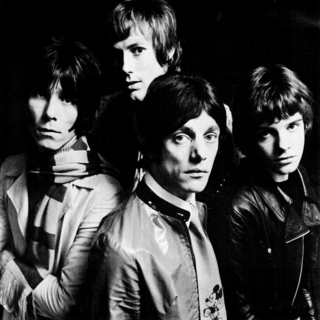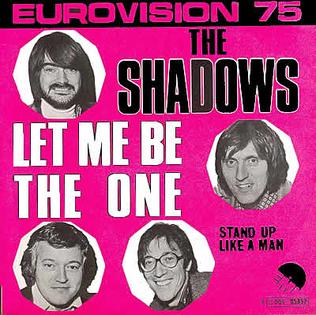
Hank Brian Marvin is an English multi-instrumentalist, vocalist, and songwriter. He is known as the lead guitarist for the Shadows.

Have You Ever Been in Love is the tenth studio album by recording artist Leo Sayer. It was originally released in November 1983 by Chrysalis (UK), and Warner Bros. (US) as the follow-up to his ninth album World Radio (1982). It was co-produced by the Grammy Award-winning Arif Mardin, in association with Alan Tarney, and Christopher Neil producing the other tracks. Sayer is credited as co-writer on the tracks "Don't Wait Until Tomorrow", and "Orchard Road".
Enrico Antonio Giorgio Spinetti is a Welsh session drummer whose playing has featured on many prominent rock and pop albums.

The Herd were an English rock band, founded in 1965. In 1966, 16-year-old Peter Frampton joined as lead singer and guitarist. The band had three UK top twenty hits in the late 1960s, including "From the Underworld" and "I Don't Want Our Loving to Die", before Frampton left in 1968 to form Humble Pie with Steve Marriott. The band broke up shortly after, reforming briefly and unsuccessfully in 1971.

The Shadows were an English instrumental rock group, who dominated the British popular music charts in the pre-Beatles era from the late 1950s to the early 1960s. They served as the backing band for Cliff Richard from 1958 to 1968, and have joined him for several reunion tours.

"What Happens Tomorrow" is a song by English rock band Duran Duran from their 11th studio album, Astronaut (2004). It was released on 18 January 2005 as the second single from that album. The song debuted at number 11 in the UK Singles Chart on 6 February 2005 and was the second single from the album to peak at number two in Italy.

Bruce Welch is an English guitarist, songwriter, producer, singer and businessman best known as a founding member of the Shadows.

Andrew Steven Bown is an English musician, who has specialised in keyboards and bass guitar. He is a member of the rock band Status Quo.

Climax Blues Band are a British blues rock band. They have released at least 19 albums. "Couldn't Get It Right" reached No. 10 on the UK Singles Chart and No. 3 on the Billboard Hot 100 in 1977. "I Love You" peaked on the Billboard chart at No. 12 in 1981.
Marvin, Welch & Farrar were a 1970s British and Australian popular music group formed by Hank Marvin and Bruce Welch, both members of The Shadows – as a change of direction manoeuvre during 1970 to 1973 – and John Farrar. The distinction was that while The Shadows were famous for their instrumental work, Marvin Welch & Farrar were a trio, vocal harmony group. They have been favourably compared to USA folk close harmony group Crosby Stills Nash and Young and The Hollies.

Terence Ernest Britten is an English-Australian singer-songwriter and record producer, who has written songs for Tina Turner, Cliff Richard, Olivia Newton-John, Status Quo and Michael Jackson amongst many others. Britten won the Grammy Award for Song of the Year in 1985 for "What's Love Got to Do with It".
Louis David Cennamo is an English bass guitarist, who has recorded and/or toured with a number of important British rock/blues/progressive bands, including The Herd, Renaissance and Colosseum.
Tarney/Spencer Band were a rock band formed in London in 1975 with Trevor Spencer on drums and Alan Tarney on lead guitar, bass guitar and lead vocals. Both had been in Australian bands, including James Taylor Move, prior to relocating to the United Kingdom, where they formed the duo. The group issued three albums, Tarney and Spencer (1976), Three's a Crowd (1978) and Run for Your Life (1979). Their single, "No Time to Lose" (1979), received airplay in the United States on album-oriented rock radio stations. It charted on the Billboard Hot 100 in both 1979 and again in 1981 upon re-issue. By the end of 1979, Tarney/Spencer Band had broken up and both founders undertook careers as songwriters, session musicians and record producers.

Diamond Cut is the third studio album by Welsh singer Bonnie Tyler. It was released in February 1979 by RCA Records.
Alan Tarney is an English record producer and musician. He was born in Northside, Workington, Cumberland, but spent his teenage years in Adelaide, Australia, where he met his songwriting and musical partner Trevor Spencer. He is best known for his association with Cliff Richard and producing "Take On Me" by a-ha.

"Let Me Be the One" was the United Kingdom's entry in the Eurovision Song Contest 1975, written by Paul Curtis and performed in English by the band The Shadows.
Trevor Spencer is an Australian songwriter, record producer and drummer. He studied drums and percussion from the age of 10. By the age of 14, he was playing professionally in bands in Adelaide and Melbourne, where he met his songwriting and musical partner Alan Tarney.

"Apache" is a song written by Jerry Lordan and first recorded by Bert Weedon. Lordan played the song on ukulele to the Shadows while on tour and, liking the song, the group released their own version which topped the UK Singles Chart for five weeks in mid-1960. The Shadows' guitarist Hank Marvin developed the song's distinctive echo and vibrato sound. After hearing the Shadows' version, Danish guitarist Jørgen Ingmann released a cover of the song in November 1960 which peaked at number 2 on the Billboard Hot 100 in the US.
Judas Jump was a British short-lived progressive rock supergroup, formed in 1969. The band released one album and three singles before disbanding in 1971. They are best known for their members who had success before and after Judas Jump.
James Taylor Move was a short-lived Australian/British psychedelic pop, progressive rock group from Adelaide. It was formed by Kevin Peek on guitar, Trevor Spencer on drums, Alan Tarney on organ, and Robert John Taylor on lead vocals and bass guitar.














